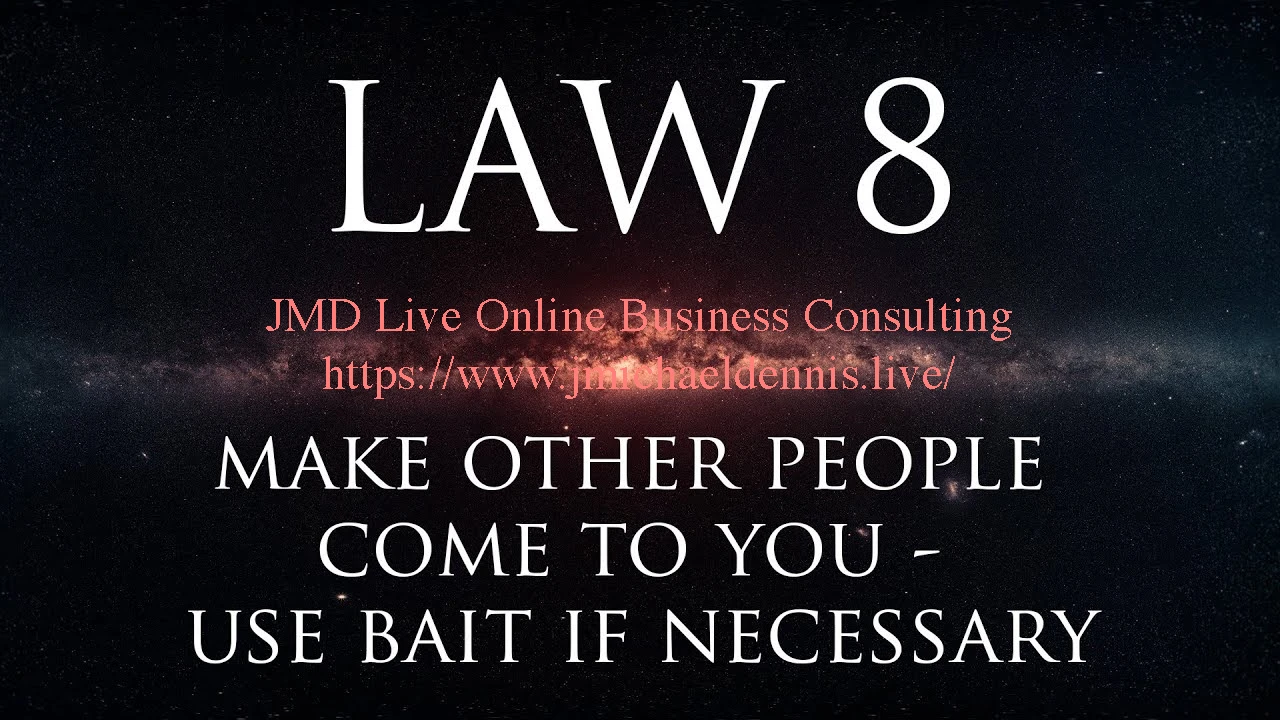“When you force the other person to act, you are the one in control. It is always better to make your opponent come to you, abandoning his own plans in the process. Lure him with fabulous gains-then attack. You hold the cards.”
How many times has this scenario played itself out in history: An aggressive leader initiates a series of bold moves that begin by bringing him much power. Slowly, however, his power reaches a peak, and soon everything turns against him. His numerous enemies band together; trying to maintain his power, he exhausts himself going in this direction and that, and inevitably he collapses. The reason for this pattern is that the aggressive person is rarely in full control. He cannot see more than a couple of moves ahead, cannot see the consequences of this bold move or that one. Because he is constantly being forced to react to the moves of his ever-growing host of enemies, and to the unforeseen consequences of his own rash actions, his aggressive energy is turned against him.
In the realm of power, you must ask yourself, what is the point of chasing here and there, trying to solve problems and defeat my enemies, if I never feel in control? Why am I always having to react to events instead of directing them? The answer is simple: Your idea of power is wrong. You have mistaken aggressive action for effective action. And most often the most effective action is to stay back, keep calm, and let others be frustrated by the traps you lay for them, playing for long-term power rather than quick victory.
The essence of power is the ability to keep the initiative, to get others to react to your moves, to keep your opponent and those around you on the defensive. When you make other people come to you, you suddenly become the one controlling the situation. And the one who has control has power. Two things must happen to place you in this position: You yourself must learn to master your emotions, and never to be influenced by anger; meanwhile, however, you must play on people's natural tendency to react angrily when pushed and baited. In the long run, the ability to make others come to you is a weapon far more powerful than any tool of aggression.
It is only natural to want to persuade people by pleading your case, imposing your will with words. But this often turns against you. All of us have only so much energy, and there is a moment when our energies are at their peak. When you make the other person come to you, he wears himself out, wasting his energy on the trip. One added benefit of making the opponent come to you is that it forces him to operate in your territory. Being on hostile ground will make him nervous and often he will rush his actions and make mistakes. For negotiations or meetings, it is always wise to lure others into your territory, or the territory of your choice. You have your bearings, while they see nothing familiar and are subtly placed on the defensive.
Manipulation is a dangerous game. Once someone suspects he is being manipulated, it becomes harder and harder to control him. But when you make your opponent come to you, you create the illusion that he is controlling the situation. He does not feel the strings that pull him.
Everything depends on the sweetness of your bait. If your trap is at tractive enough, the turbulence of your enemies' emotions and desires will blind them to reality. The greedier they become, the more they can be led around. When you are making people come to you, it is sometimes better to let them know you are forcing their hand. You give up deception for overt manipulation. The psychological ramifications are profound: The person who makes others come to him appears powerful and demands respect. If on one occasion you make it a point of dignity that others must come to you and you succeed, they will continue to do so even after you stop trying.
EXCEPTION TO THE RULE
Although it is generally the wiser policy to make others exhaust themselves chasing you, there are opposite cases where striking suddenly and aggressively at the enemy so demoralizes him that his energies sink. Instead of making others come to you, you go to them, force the issue, take the lead. Fast attack can be an awesome weapon, for it forces the other person to react without the time to think or plan. With no time to think, people make errors of judgment, and are thrown on the defensive. This tactic is the obverse of waiting and baiting, but it serves the same function: You make your enemy respond on your terms.
A rapid and unforeseen move is terrifying and demoralizing. You must choose your tactics depending on the situation. If you have time on your side and know that you and your enemies are at least at equal strength, then deplete their strength by making them come to you. If time is against you, your enemies are weaker, and waiting will only give them the chance to recover, give them no such chance. Strike quickly and they have nowhere to go.
Michel Ouellette JMD, ll.l., ll.m.
JMD Live Online Subscription link.
J. Michael Dennis, ll.l., ll.m.
Business & Corporate Strategist
Systemic Strategic Planning
Quality Assurance, Occupational Health & Safety, Environmental Protection, Regulatory Compliance, Crisis & Reputation Management
Skype: jmdlive
Email: jmdlive@jmichaeldennis.live
Web: https://www.jmichaeldennis.live
Phone: 24/7 Emergency Access
Available to our clients/business partners


